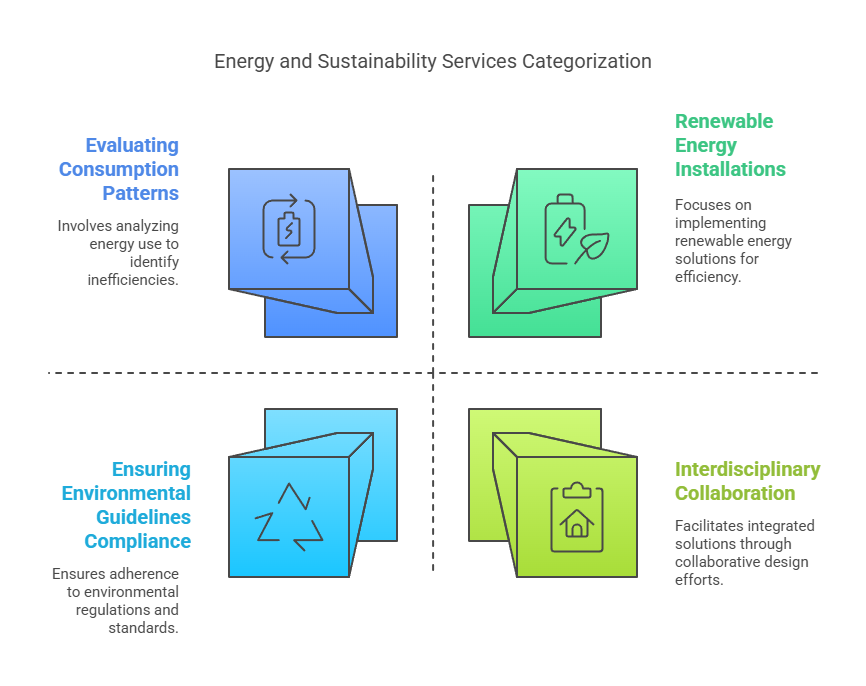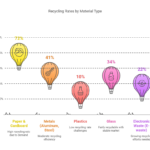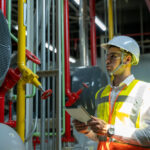As global momentum intensifies around sustainable solutions, Energy Engineers in Canada have emerged as essential contributors to the nation’s shift toward cleaner, more efficient energy systems. These professionals design, implement, and optimize energy technologies and practices to minimize environmental impact and reduce costs. In this comprehensive overview, we explore the current state of energy engineering in Canada, from its rapidly growing demand to strategies for recruiting top talent, and everything in between.
The Role of an Energy Engineer
Energy Engineers in Canada focus on developing and implementing solutions that elevate energy efficiency and increase the use of renewables such as wind, solar, hydro, and biomass. Their scope of work is both wide-ranging and specialized, encompassing:
- Energy Audits and Analyses
- Evaluating consumption patterns in buildings, industrial facilities, and infrastructure.
- Identifying inefficiencies and recommending corrective measures.
- Sustainable System Design
- Crafting renewable energy installations (e.g., solar PV arrays or geothermal systems).
- Integrating energy storage solutions, advanced HVAC systems, or waste-heat recovery processes.
- Regulatory Compliance and Standards
- Ensuring projects and operations meet federal and provincial environmental guidelines (such as those set by Environment and Climate Change Canada).
- Advising stakeholders on upcoming policy changes and how to align business practices to remain compliant.
- Interdisciplinary Collaboration
- Working closely with architects, planners, policymakers, and fellow engineers (e.g., mechanical, electrical, civil) to ensure integrated, long-lasting solutions.
Energy Engineers are pivotal in sectors like manufacturing, construction, public infrastructure, and transportation, all of which increasingly rely on low-carbon technologies to achieve sustainability targets.

Current Demand for Energy Engineers in Canada
Rising environmental concerns, strong provincial renewable energy targets, and federal commitments to reduce greenhouse gas (GHG) emissions have propelled demand for energy engineers across Canada. Recent data from Job Bank Canada and various provincial labor market outlooks indicate:
- Number of Energy Engineers: Approximately 12,500 professionals work in energy engineering or closely related fields nationwide.
- Projected Growth: Estimates show a 9% to 12% increase in energy engineering roles between 2025 and 2035, fueled by policy-driven and market-based expansions in renewable energy.
- Provincial Hotspots: Provinces like Ontario, Alberta, and British Columbia see the highest demand. Quebec and Saskatchewan are also ramping up energy transition initiatives, presenting new hiring opportunities.
Key Factors Driving Growth
- Renewable Energy Investments
- Canada’s continued move towards wind, solar, and hydroelectric power spawns a need for specialized design, oversight, and operations roles.
- Energy Efficiency Initiatives
- Stricter building codes and industrial regulations accelerate investments in retrofitting, advanced HVAC systems, and state-of-the-art manufacturing processes.
- Regulatory Landscape
- Federal and provincial climate policies (e.g., carbon pricing, incentive programs) necessitate professionals adept at bridging compliance requirements with technological solutions.
Salary Trends in Canada
According to surveys collated from PayScale Canada, Indeed, and provincial engineering associations, compensation for energy engineers can differ based on region, qualifications, and the specific industry sector. As of 2025, approximate figures include:
- Average Annual Salary: Around CAD 85,500 for mid-career positions.
- Entry-Level: Salaries start near CAD 65,000, rising with credentials and hands-on experience.
- Senior Professionals: Those with 10+ years of specialization or project leadership roles can command incomes exceeding CAD 115,000.
- Regional Variations: Energy engineers in high-cost, high-demand markets like Greater Toronto Area and Vancouver may see salaries 10%–20% above the national average, reflecting intensified competition and cost of living factors.
Tip: While salary is a leading consideration for many jobseekers, benefits and work-life flexibility (e.g., remote work, generous leave policies) increasingly influence where top energy engineers choose to work.
Skills and Qualifications Required for Energy Engineers
Educational Requirements
- Bachelor’s Degree
- Programs in mechanical, electrical, chemical, or environmental engineering typically serve as entry points.
- Several Canadian universities now offer specialized streams or minors in energy systems engineering.
- Master’s Degree (Optional but Beneficial)
- Advanced degrees focusing on renewable energy, sustainable design, or environmental management provide a competitive edge.
- Thesis-based programs often enable in-depth research and collaboration with industry partners.
- Certifications
- Certified Energy Manager (CEM), awarded by the Association of Energy Engineers, is widely recognized.
- LEED (Leadership in Energy and Environmental Design) credentials are valuable for engineers emphasizing green building projects.
- P.Eng. (Professional Engineer) licensure through provincial engineering regulatory bodies (e.g., PEO in Ontario, APEGA in Alberta) often enhances credibility and career growth.
Essential Technical Skills
- Energy Auditing & Analysis
Knowledge of diagnostic tools, from blower-door tests to data loggers, plus software like RETScreen for feasibility studies. - Renewable Energy Systems
Expertise in designing and modeling wind, solar, hydro, or geothermal installations. - HVAC and Building Systems
Familiarity with advanced heating, cooling, and ventilation strategies for net-zero or ultra-low-energy buildings. - Data Analytics & Software
Proficiency in simulation and modeling programs (e.g., EnergyPlus, HOMER) to forecast performance and ROI. - Regulatory Frameworks
Understanding of Canada’s environmental statutes, codes, and industrial standards related to energy usage and emissions.
Soft Skills Employers Look For
- Problem-Solving: Aptitude for diagnosing inefficiencies and engineering tailored solutions.
- Communication: Ability to translate complex technical data into actionable recommendations for non-technical stakeholders.
- Project Management: Balancing timelines, budgets, and resources effectively.
- Collaboration: Coordinating with cross-functional teams, from policy advisors to mechanical contractors.
Industries and Sectors Hiring Energy Engineers
Below is a summary of key industries in Canada where energy engineers can be found, including typical roles and responsibilities.
| Industry Sector | Job Roles and Responsibilities |
| Renewable Energy | – Designing, installing, and optimizing solar, wind, and hydroelectric projects. – Conducting site assessments and feasibility studies for new setups. |
| Manufacturing | – Conducting energy audits in production lines. – Implementing waste-heat recovery and process optimization. |
| Construction & Green Building | – Collaborating with architects on energy-efficient building designs. – Managing HVAC and insulation system improvements to meet LEED or Net-Zero goals. |
| Government & Policy | – Drafting regulatory guidelines, emissions standards, and incentive frameworks. – Overseeing public-sector sustainability initiatives and audits. |
| Transportation & Automotive | – Advancing battery technology and charging infrastructure for electric vehicles. – Improving energy efficiency in mass transit systems (buses, rail). |
Canada’s shift toward clean, reliable, and resilient energy underscores the need for robust engineering talent in each of these areas. The specifics of a role—whether analyzing advanced combustion systems or championing solar array installations—vary significantly based on the chosen sector and region.
Challenges in Energy Engineer Staffing
Despite strong demand for energy engineers, various obstacles can complicate recruitment and workforce planning:
- Shortage of Skilled Professionals
- The pace of technological advancements in energy can outstrip the training supply, especially in cutting-edge areas like green hydrogen or large-scale battery storage.
- Many experienced engineers are nearing retirement, magnifying skill gaps.
- Competitive Job Market
- Rapid industry growth has intensified competition, pushing employers to offer more enticing compensation, flexible work arrangements, and robust career development paths.
- Regions with industrial clusters (e.g., southwestern Ontario’s manufacturing corridor) sometimes face local shortages, spurring salary escalations.
- Geographical Imbalances
- Rural areas often struggle to attract specialized engineers, whereas major urban centers become saturated.
- Provinces heavily reliant on traditional energy industries (e.g., Alberta’s oil and gas sector) grapple with transitions to renewables, requiring re-skilling initiatives.
- Evolving Regulatory & Policy Environment
- Energy legislation is frequently updated at both provincial and federal levels, demanding engineers who remain informed about shifting compliance requirements.
- Keeping Pace with Innovation
- From AI-driven “smart grids” to advanced building materials, innovation evolves quickly, and sustained professional development is needed for engineers to remain relevant.
Strategies for Effective Energy Engineer Recruitment
Amid these challenges, employers can deploy various methods to attract and retain talented energy engineers:
Strengthening Educational Partnerships
- University Collaborations
- Working with Canadian universities (e.g., University of Toronto, University of British Columbia, University of Alberta) to shape curricula in line with industry demands.
- Sponsoring capstone projects, research chairs, or scholarships to cultivate early engagement with high-potential candidates.
- Co-op and Internship Programs
- Offering structured work placements that let students gain real-world experience.
- Building direct pipelines for entry-level hires who already understand a company’s processes.
Investing in Professional Development
- Continuous Training
- Hosting workshops, lunch-and-learns, and specialized courses on emerging technologies like carbon capture or advanced biofuels.
- Credential Support
- Funding employees’ certifications (e.g., CEM, LEED) or membership in professional associations like the Association of Energy Engineers (AEE).
- Knowledge Sharing
- Encouraging senior-level mentorship to pass on specialized know-how, particularly in niche areas such as thermal system modeling or zero-carbon building design.
Competitive Compensation and Benefits
- Attractive Salary Packages
- Reflecting the specialized skill set and scarcity of high-caliber energy engineers in certain regions.
- Work-Life Balance
- Flexible hours, hybrid or remote work arrangements, and extended leave policies to appeal to a diverse talent pool.
- Career Advancement
- Establishing clear pathways for professional growth, from junior engineering associate to lead engineer or managerial roles.
Leveraging Recruitment Technology
- AI-Driven Candidate Sourcing
- Automating resume screening to find top talent with specific skill sets (e.g., wind turbine design, building envelope modeling).
- Applicant Tracking Systems (ATS)
- Streamlining the hiring process and creating robust candidate databases for future openings.
Promoting Diversity and Inclusion
- Targeted Outreach
- Engaging underrepresented groups through specialized job fairs, STEM scholarships, and community programs.
- Inclusive Culture
- Fostering an environment where everyone’s viewpoints and backgrounds inform decision-making, spurring creativity and enhanced problem-solving.
Staffing Challenges
Even with strong growth, Canada’s energy sector faces significant hurdles in securing the necessary engineering workforce. These include:
- Skills Gap: Rapid technological change (e.g., in hydrogen fuel cells, grid-scale battery systems) widens the gap between academic programs and on-the-ground needs.
- Aging Workforce: Many seasoned professionals in oil and gas or utility companies are retiring. Their specialized knowledge isn’t always replaced quickly enough by graduates or mid-career entrants.
- Industry Competition: Sectors like finance or tech often seek engineers with strong math and data skills, luring them away from the energy industry.
- Regional Variability: Remote or Northern communities might have trouble attracting top-tier talent, while major city centers can be inundated with applicants who require advanced roles or higher salaries.
Strategies for Effective Staffing
To mitigate these recruitment hurdles, Canadian organizations can take the following steps:
- Educational Partnerships
- Collaborate with technical institutes (e.g., SAIT in Alberta, BCIT in British Columbia, or Conestoga in Ontario) to tailor certificate programs aligned with emergent energy fields, from solar photovoltaics to carbon management.
- Upskilling and Reskilling
- Offer courses that help legacy oil and gas engineers transition to renewable energy roles—e.g., advanced pipeline engineers learning how to design hydrogen distribution networks.
- Provide online learning platforms or subsidized continuing education to keep employees current.
- Diversity and Inclusion Initiatives
- Develop mentorship programs for Indigenous or underrepresented communities, ensuring broader participation in energy engineering roles.
- Adopt inclusive policies that encourage women and minority graduates to pursue leadership or specialized technical tracks.
- Competitive Compensation
- Beyond base salary, offer benefits such as relocation allowances, tuition reimbursements, on-site childcare, or extended health coverage to stand out in the marketplace.
Salary Trends for Energy Engineers
The table below provides an overview of salary expectations for energy engineers in Canada, segmented by experience level:
| Experience Level | Average Salary (CAD) |
| Entry-Level (0-3 years) | $65,000 – $70,000 |
| Mid-Career (4-9 years) | $75,000 – $90,000 |
| Senior-Level (10+ years) | $100,000 – $115,000+ |
Note: These figures are estimates, and actual compensation can vary depending on geographic location, industry sector, and the complexity of projects handled.
(FAQ) Frequently Asked Questions
- What is the overall job outlook for energy engineers in Canada?
Demand continues to rise as governments, businesses, and communities emphasize clean energy and energy efficiency. Growth rates of around 9% to 12% are anticipated over the next decade. - Which industries hire energy engineers most frequently?
Sectors like renewable energy, manufacturing, construction and green building, government and policy, and transportation stand out. Each industry presents unique job functions—from systems design to regulatory oversight. - Are professional certifications necessary to secure better roles?
While not always mandatory, certifications such as CEM or LEED can significantly boost credibility and earning potential. Many employers view them as indicators of specialized skill and dedication to sustainability. - What essential skills should a new graduate develop to thrive in this field?
A solid grasp of energy audits, renewable systems design, HVAC efficiency, data analytics, and Canadian energy regulations are key. Soft skills—like communication and project management—are also crucial. - How can employers attract top-tier energy engineering talent?
Competitive salaries, robust professional development programs, a supportive corporate culture, and an emphasis on meaningful work in the clean energy transition make positions more attractive to qualified candidates. - Do energy engineers only work on large-scale power projects?
Not at all. They also optimize building systems, advise on public policy, design small-scale microgrids for communities, and consult on industrial upgrades. The field encompasses both large infrastructure projects and localized improvements. - Is there demand for energy engineers in rural or remote parts of Canada?
Yes. Resource-rich provinces and regions engaged in renewables development often need specialized talent. Incentives like relocation grants, flexible work, or housing supports are sometimes offered to lure professionals outside major cities.
Key Takeaways for Staffing in Energy Engineering
- Steady Growth: Canada’s transition to greener energy is fueling a rise in job openings for energy engineers.
- Skills Emphasis: Specializations in renewables, efficiency upgrades, and advanced analytics are especially prized.
- Recruitment Challenges: Competition is stiff, and retiring talent intensifies skill gaps. Fostering education partnerships and offering strong benefits can help.
- Broader Opportunities: Industries spanning construction, utilities, manufacturing, and public policy all seek energy engineering expertise.
- Continuous Learning: With evolving technology and regulations, ongoing professional development remains critical to career success.
Partnering with RSS Staffing
For Canadian businesses looking to secure temporary or long-term Energy Engineers, RSS Staffing is your strategic partner. Our extensive talent network spans Ontario, Quebec, Alberta, British Columbia, and beyond—ensuring you have quick access to the expertise needed to design and implement energy-efficient projects. Whether you’re seeking a specialized professional for a short-term retrofit study or a comprehensive team to drive large-scale clean energy transitions, RSS Staffing delivers:
- Vetted, Skilled Engineers: We pre-screen candidates to confirm their technical know-how and understanding of relevant Canadian regulations.
- Flexible Engagements: Customized placement options—from temporary project-based engagements to ongoing staff augmentation.
- Ongoing Support: Our team remains committed to helping you tackle unexpected challenges and adapt your workforce to evolving industry demands.
Final Positive Thoughts
Canada stands at the forefront of a sweeping global shift toward sustainable energy. Energy Engineers, with their diverse skill sets and passion for innovation, are helping shape a cleaner, more prosperous future—from downtown Toronto to the northern reaches of Alberta, from the coasts of British Columbia to the heart of the Prairies. Whether optimizing an industrial process, designing a net-zero building, or orchestrating the grid integration of renewable sources, these professionals make an outsized impact on both the economy and the environment.
For jobseekers, this era of transformation offers remarkable opportunities to build fulfilling, high-impact careers. For employers, recruiting and retaining top energy engineering talent is an investment that ensures continued relevance in an increasingly green economy. By collaborating effectively—through informed hiring practices, strategic upskilling, and inclusive workplace cultures—Canada’s energy engineering community is poised to unlock new frontiers in sustainability, innovation, and economic growth.
Websites Referenced for Canadian Data
- Job Bank Canada: www.jobbank.gc.ca
- PayScale Canada: www.payscale.com
- Environment and Climate Change Canada (ECCC): www.canada.ca/en/environment-climate-change.html
- Natural Resources Canada (NRCan): www.nrcan.gc.ca
- Association of Energy Engineers (AEE): www.aeecenter.org










